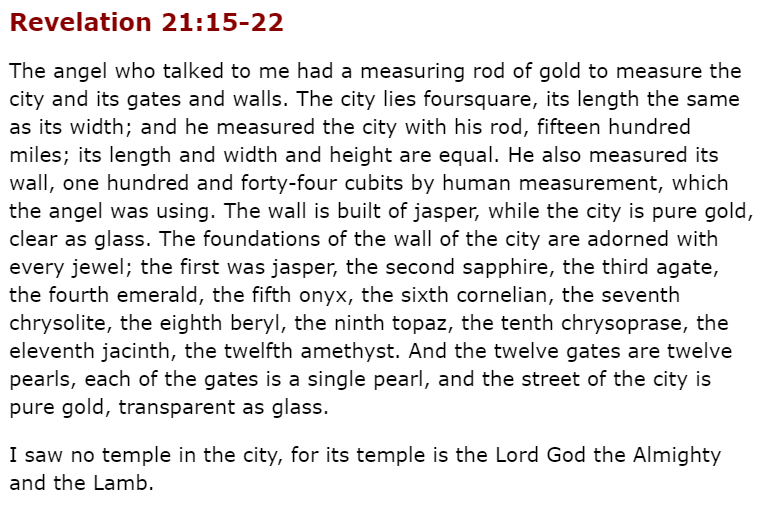"But those who drink of the water that I will give them will never be thirsty." -John 4:14
Tuesday, May 31, 2022
Luke 1:39-57 The Holy Spirit in Community
Tuesday, May 24, 2022
Revelation 21:15-22, "Resistance is Futile" ;-)
Application: Just as with many verses from Revelation, you can go down all sorts of rabbit holes if you try to take it literally. You could plot out what water, sewer, and electricity would need to be for such a facility, get with some urban planners, and predict the cost of construction and predicted population. That's one way to resist what the text is really trying to say to us.
You could also do a deep dive into the symbolism, talk about the precious stones (which happen to be the same ones on the high preist's breastplate in the Old Testament, which means the city itself is a temple!) or other details of the text. That might yield some intellectual insights, but it might also distance you from the meaning of the text for our hearts. Another way of resisting the meaning.
The best way to stop "resisting" the meaning of this text, for me, is to just ask: what is God saying to me in the midst of this? And to that, the answer is simple. "I want to be close to you." God's desire is to live with us, in such a way that there aren't any divisions between the holy and the common, between the people we wish we could be and the people we know we are. There won't be temples or churches, where we set aside a little of our time, talent and treasure for a little of our week. We will live together with the one who created us and saved us. It may not look like a "Borg cube", and it may not be solid gold, but it will be deeply meaningful and rewarding. It will be life as God meant it to be.
Prayer: God, sometimes I use my mind to take a step back, and resist hearing what you have to say to my heart. Help me take a break from that today. Amen.
Tuesday, May 17, 2022
Acts 11:27-30 Dwelling Together in Unity
 Observation: In a time of famine, the church in Antioch (Paul's home church) undertakes the first large scale relief effort to benefit Christians in Judea, where this whole movement started. Christians in this time share a close bond, which in that time was socially similar to kinship. Much of their property was held in common. Caring for members in the community was a high priority at a time when there was no social safety net. It was not just a figure of speech to say they lived like a family.
Observation: In a time of famine, the church in Antioch (Paul's home church) undertakes the first large scale relief effort to benefit Christians in Judea, where this whole movement started. Christians in this time share a close bond, which in that time was socially similar to kinship. Much of their property was held in common. Caring for members in the community was a high priority at a time when there was no social safety net. It was not just a figure of speech to say they lived like a family.Tuesday, May 10, 2022
Acts 9:32-35 Here and There Among All the Believers
 |
| Father Henry Whitehead, curate of St Luke's Parish, Soho, London, 1854 |
The second thing I notice is that Peter meets Aeneas by going "here and there among all the believers." He's on patrol, so to speak. His job as shepherd of the flock is to be walking around, visiting with people and listening to their problems.
Application: Aeneas's healing story reminds me of a book I read several years ago called "The Ghost Map," a nonfiction account of the cholera outbreak of Soho, London in 1854, an early test case for the germ theory of contagion that was later proven correct. Doctor John Snow has, rightly, been given credit for pinpointing a certain well in Soho that was making people sick due to unsanitary conditions. But the other part of the story is where Dr. Snow got much of his raw data: from an Anglican priest named Henry Whitehead, who knew who was getting sick, where, when, and which well they drank from, because he was doing the same job pastors have done for centuries. He was going "here and there among all the believers." He walked the streets, talked to people at home, at work, and all around his parish--which meant not just those who faithfully worshipped at his church, but everyone who lived and worked nearby. He was responsible for their spiritual welfare, but because he cared for the whole person, he provided a vital piece of the puzzle for a public health mystery that had plagued Europe for centuries and caused untold deaths. God put Father Whitehead in the right place at the right time.
Pastors do a lot of things. In fact, each new generation seems to pile on a new job title: administrator, therapist, cruise director, community organizer, entrepreneur, broadcaster, the list goes on and on. But Peter's story in Acts 9, and the story of Snow and Whitehead, remind me of a role that can't be neglected: shepherd. It's important to be in one another's lives at times other than Sunday. To visit, and check in, both physically and digitally, not just in times of crisis but on regular days too. We could all stand to follow Peter's example. You never know what tasks God will assign you until you go "here and there among all the believers."
Prayer: God, send me out on patrol today. Help me connect with the people in my "parish" here in Northern Michigan, both members of our church and those in our neighborhood. I'm ready to work. Amen.
Tuesday, May 3, 2022
Ezekiel 1:26-2:1 Who You're Talking To





